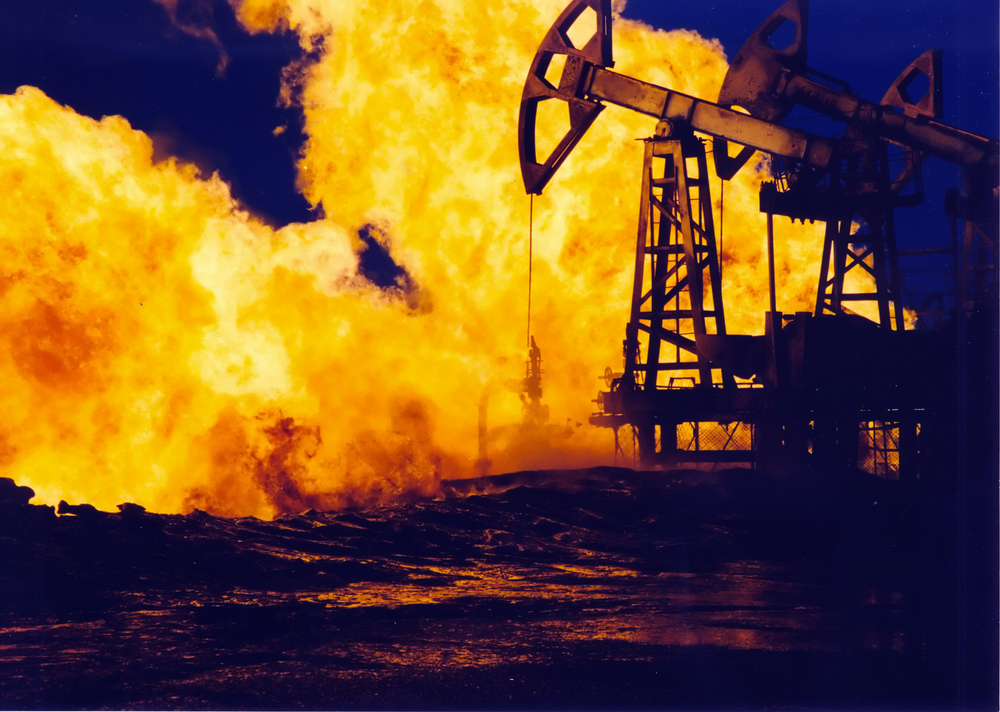QAYYARA, Iraq (Thomson Reuters Foundation) – Under a cloud of black smoke, a group of around a dozen children wearing flimsy sandals have gathered to play.
Oil wells around the Iraqi town of Qayyara are still burning, weeks after they were torched by Islamic State militants in an attempt to slow the Iraqi army’s advance.
Under the shadow of an oil fire, the children are coated in black soot. “Yes, yes!” they said, coughing, when asked if they were suffering from breathing difficulties because of the smoke.
“We are scared of it, the smoke makes it difficult to breathe,” said a 10-year-old girl with green eyes and gold and red sandals caked in dirt. Not far away, an Iraqi soldier fired a few rounds from his Kalashnikov rifle into the air.
A month into their battle with Iraqi forces for control of the city of Mosul, the jihadists are leaving behind not just physical devastation but environmental damage from a cocktail of toxic pollutants, human rights groups say.
In Qarraya, a town 60 km (35 miles) south of Mosul, Islamic State fighters launched at least three chemical attacks in September and October after Iraqi forces recaptured the town in August, Human Rights Watch (HRW) said in a report last week.
A chemical weapons expert told HRW the attacks caused painful burns to at least seven people, consistent with exposure to low levels of a chemical warfare agent known as ‘vesicants’, or blister agents.
“ISIS attacks using toxic chemicals show a brutal disregard for human life and the laws of war,” said Lama Fakih, HRW’s deputy Middle East director, referring to Islamic State.
“As ISIS fighters flee, they have been repeatedly attacking and endangering the civilians they left behind, increasing concerns for residents of Mosul and other contested areas.”
The United Nations says Islamic State is stockpiling ammonia and sulphur in civilian areas and fears it intends to carry out more chemical attacks as Iraqi forces, backed by U.S. air power, battle the jihadists in an effort to drive them out of Mosul, their last major stronghold in Iraq. [nL8N1DD0B5]
OIL WELLS TORCHED
In Qayyara, children and adults still remember public acts of violence and executions for disobeying the strict laws of the ultra-hardline Sunni Muslim group that seized the town in 2014.
“They closed our schools and taught (our people) how to kill, fight, and sacrifice,” said Anas Mahmood, 21, who refused to join the militant group but missed two years of education while living under Islamic State.
Now the smoke haze from oil fires is a constant reminder of the destruction wrought by the militants.
Since the beginning of the summer, Islamic State fighters have set fire to more than a dozen oil wells in the area, according to the United Nations.
In late October, the embattled militants set fire to stocks of sulphur at the Mishraq chemical plant south of Mosul as Iraqi forces advanced, residents said.
The noxious sulphur clouds caused a burning sensation in the throat and sore, red eyes for those living nearby in Qayyara. That fire has now been extinguished, but most of oil fires are still burning, resulting in breathing difficulties, skin problems and misery.
At the medical clinic in Qayyara, the chief nurse, Miriam Ali, 50, said she had seen dozens of cases of civilians struggling to breathe.
The clinic is poorly supplied and without adequate power. Empty oxygen canisters line the wall outside the treatment rooms. A man was carried into the clinic with a white cloth over his mouth, gasping for breath.
“Our biggest problem is the smoke,” Ali told the Thomson Reuters Foundation. “Even our health workers here are suffering from difficulty breathing.”
Children are especially at risk because they have smaller airways and are closer to the ground where sulphur oxides and other fumes accumulate, Wael Hatahet, a technical officer for the World Health Organization (WHO) told the Thomson Reuters Foundation in an email.
A 100,000-strong alliance of Iraqi forces, backed by U.S.-led coalition airstrikes, has almost surrounded Mosul, a month into the campaign to drive out Islamic State.
The jihadists’ defences have been breached only in the east of the city but Iraqi forces have recaptured dozens of towns and villages in the surrounding areas.
More than 54,000 people have been displaced so far in the campaign and ultimately, 700,000 people are thought likely to need shelter, food, water or medical support.
Ahmed Ali, 29, took part in the battle to retake Qayyara and said the fighting was particularly fierce around the main hospital. Now, he lives close to one of the burning oil pits.
“This is not a normal life,” he said. “At night the smoke comes down on the cities and the houses … our health is bad and everything is destroyed.”
(Editing by Ros Russell; Please credit the Thomson Reuters Foundation, the charitable arm of Thomson Reuters, that covers humanitarian news, women’s rights, trafficking, corruption and climate change. Visit news.trust.org)
Copyright 2015 Thomson Reuters. Click for Restrictions.


